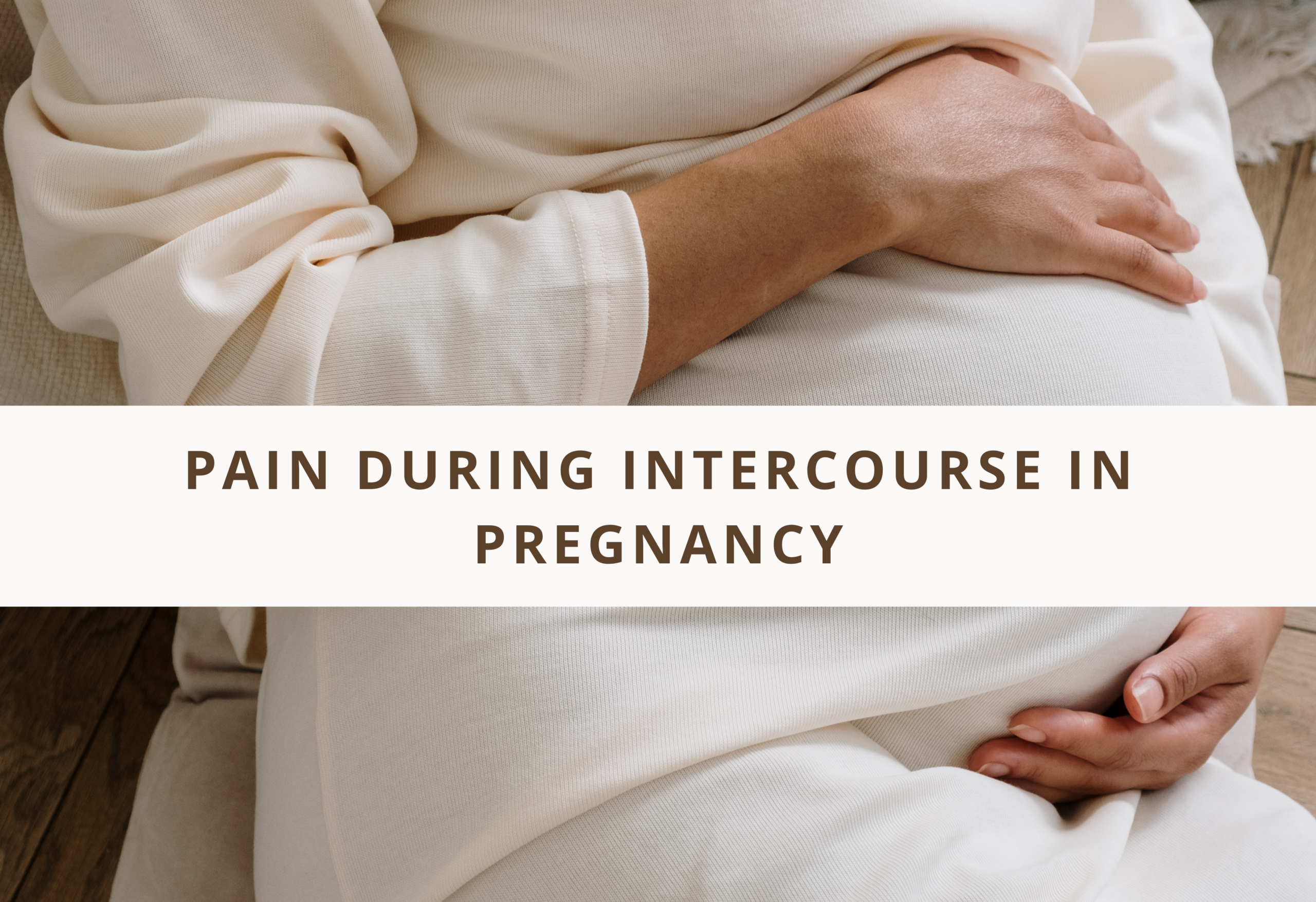Having pain during intercourse in pregnancy, also known as dyspareunia, can happen when someone is pregnant or has recently had a baby. How often this pain happens can change a lot, with some people feeling it more in the later part of pregnancy and for others, it might continue after the baby arrives.
Even though it can really affect someone’s happiness and relationships, this problem doesn’t always get the attention it needs. There is no shame in communicating with your midwife or health care provider about having dyspareunia. Intimacy with your partner is an important part of an intimate relationship and you deserve help and resources to help you have enjoyable and comfortable intimacy with your partner during pregnancy and beyond.
What Causes Pain during intercourse in pregnancy?
A few things can make this pain happen during and after pregnancy. Changes in the body, hormone levels going up and down, and how people feel about becoming a parent can all play a part. The pain might get worse from the middle of pregnancy until about three months after the baby is born. For many, the pain lessens after that but doesn’t always go away completely.
Some studies have tried to figure out what makes pain during intercourse in pregnancy more likely to happen, looking at things like how the baby is delivered or if the parent chooses to breastfeed. The results have been mixed, but it’s good to know that not all these factors will make the pain happen. This shows us that both body and mind play roles in this kind of pain and both need to be considered when looking for ways to help.
The Psychological Side of Pain During Intimacy
Feeling extremely worried about pain during intercourse in pregnancy, a feeling called pain catastrophizing, is a big sign that the pain might keep going. This worry about the pain shows why it’s so important to take care of both mental and physical health when dealing with pain during intimacy.
Advice on Managing Pain During intercourse in pregnancy
It’s really important to start looking into and treating this pain early on. Treatments that have been studied and work, like talking therapy, exercises for pelvic floor muscles, and some creams, can help. Checking for things like how much someone worries about the pain can also help find those who might have a harder time and make sure they get the right help quickly.
When to contact your midwife
If intimacy is painful, it’s really important to talk to start a discussion with your midwife or healthcare provider about it. They can give support, suggest treatments and advice that can help you through this new obstacle. You’re not alone in this, and there is help out there!
Figuring out how to manage pain during intercourse in pregnancy or after having a baby is really important for a person’s health and happiness. Intimacy with your partner is an important part of your connection to one another. By looking at both the body and mind aspects that might cause this pain, sex-positive midwives and healthcare providers can give better care and support through this big change in life.
FAQs about Pain during intercourse in pregnancy
Is it normal to feel scared about intimacy during pregnancy because of the pain?
- Yes, it’s completely normal to feel worried or scared about intimacy if you’ve experienced pain before. These feelings can sometimes make the situation more stressful. It’s important to communicate openly with your partner and consider seeking guidance from a healthcare provider like a pelvic floor PT who can offer strategies and exercises to manage this fear and make intimacy more comfortable.
Can changing positions help reduce pain during intimacy in pregnancy?
- Absolutely, changing positions can make a big difference. Some positions may put less pressure on areas that are sensitive or painful. Experimenting gently to find what feels best for you and your partner is a good approach. Remember, comfort and mutual enjoyment should always be your guide.
Is lubrication helpful for reducing pain during intimacy while pregnant?
- Yes, using a water-based lubricant can significantly reduce discomfort during intimacy by decreasing friction. Make sure to choose products that are safe for pregnancy, and don’t hesitate to apply as much as needed to ensure comfort. Your midwife may have samples pregnancy safe lubrication that you can try with your partner.
Will the pain during intimacy affect my baby?
- No, the pain you’re experiencing during intimacy won’t directly affect your baby. Your baby is protected by the amniotic fluid and the strong muscles of the cervix and uterus. However, if intimacy causes significant discomfort or stress for you, it’s important to address it for your own well-being.
Can exercises other than Kegels help with reducing pain during intimacy in pregnancy?
- Yes, other exercises can also be beneficial. For instance, yoga and Pilates can improve your flexibility and strengthen your pelvic floor, which might help reduce discomfort. Always consult with your healthcare provider before starting any new exercise regimen during pregnancy to ensure it’s safe for you and your baby. A Pelvic floor Physical Therapist could be a wonderful guide to finding helpful exercises that could benefit you!
Additional Resources for managing Pain during intercourse during pregnancy
Pelvic Floor Therapy
A pelvic floor physical therapist specializes in the treatment and management of conditions affecting the pelvic floor muscles, which are crucial during pregnancy and the postpartum period. Throughout pregnancy, the body undergoes significant changes that put pressure on the pelvic floor, potentially leading to discomfort, incontinence, or pelvic pain.
A pelvic floor physical therapist can provide tailored exercises and techniques to strengthen these muscles, helping to support the uterus and bladder, reduce pain, and prepare the body for childbirth. After delivery, they assist in the recovery process, addressing any discomfort, weakness, or dysfunction that may have arisen during childbirth. By working with a pelvic floor physical therapist, individuals can enhance their overall comfort during pregnancy, facilitate a smoother birth process, and expedite postpartum recovery, making them an invaluable resource for expectant and new parents. Below is a list of Central Oklahoma Pelvic Floor Therapists.
Online Educational Resources
- When Sex Is Painful from ACOG
- Women’s sexual health: When being intimate hurts from the Mayo Clinic
- Why does sex hurt? from the UK National Health Service
- Learn more about common pregnancy discomforts here.





